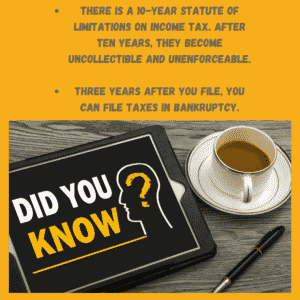Sometimes you want to sue either the IRS or the state tax department in bankruptcy court to determine if the tax was discharged. Income taxes can generally be discharged three years after the return is due. You can ask the judge to determine whether or not you successfully discharged your tax debt. After all, do you trust the debt collector or tax department to tell you the truth about whether you owe the debt?
You can sue the IRS in bankruptcy court and determine if the taxes are dischargeable. I would suggest to you that you can never trust the tax department or student loan debt collector. They don’t work for you. They do not owe you any duty to ensure you pay the smallest tax or smallest student loan monthly payment.
Only income taxes can be discharged but after the judge determines dischargeability the issue is settled. You don’t have to just guess whether the tax department can collect you can know it. If you file an adversary proceeding to determine the dischargeability of a debt, the caption must have both the adversary and main case number. For a tax department or the department of education, it must also be properly served by the attorney general, tax department, and tax commissioner.

How to Sue the IRS in Bankruptcy Court
To sue the IRS in Bankruptcy Court you have to do one or all of the following:
- Object to a claim.
- Object to any motion they file.
- File an adversary proceeding.
- File an action for contempt.
Reasons to sue the IRS in bankruptcy court.
Why sue the IRS in Bankruptcy Court? The two reasons are as follows:
- Determine the real amount due.
- Get the protection of the bankruptcy stay from the bankruptcy court.
The tax department must file its proof of claim within 180 days in any Chapter 13. If it does not file its claim the tax is discharged if it is unsecured. However, a tax is never discharged if the tax is non-dischargeable due to non-filing, evasion or fraud.
So a debtor may wish to file a claim for the tax department to fix the status and amount that needs to be paid if no claim is timely or properly filed. Amended claims can’t include additional taxes such as a different tax or additional tax years. Here is our article on how to file bankruptcy on income taxes.
Litigation advantages to suing the IRS in bankruptcy court.
There is less abuse or discrimination in bankruptcy court than there is in tax court or by trying to resolve issues and debts internally with the IRS. Although there is an obligation to exhaust administrative remedies first, in some cases, the bankruptcy judge is the way to go. In bankruptcy court, you can do the following:
- Determine the validity or amount of the tax 11 USC 505 you can’t re-litigate but the default was never litigated.
- Resolve dischargeability.
- Determine if the 10 or 15-year statute of limitations has passed and the debt can no longer be collected.
- Investigate how the tax department handled your case through discovery.
- Settle proof of claims and amended or improperly filed or previously discharged claims.
- Fix the status of the tax as secured, priority, or unsecured.
- Object to a tax lien that was improperly filed or cram down the lien.
- Determine innocent spouse status.
- Correct a violation of the stay or discharge.
- Shift burdens to the IRS to prove the tax is valid after you make an initial case Nunez 232 B.R. 778.
- You can seek damages by suing the state tax director personally.
Obtaining damages.
To obtain damages you have to exhaust all the administrative remedies first. However, sometimes a due process hearing or appeal might not be possible or might be futile. See 28 USC 524 362 and 28 USC 7433 (e) (1), and 7433(b) see also In Re Parker 279 BR 596 (S.D. Ala. 2002S). We use tax discharge determinator to determine whether the debt is dischargeable and we have also taught how to discharge debts with Morgan King and attended seminars with Larry Heinkel.
 Resources for Bankruptcy
Resources for Bankruptcy
IRS Transcript Codes for Bankrupting Taxes
Chapter 13 and IRS Tax Returns and Refunds in Bankruptcy
How to Sue the IRS in Bankruptcy Court
File Bankruptcy on Income Taxes
If you are thinking about filing bankruptcy, don’t delay because timing is crucial. I am here to help you. So, contact my office right away to start the conversation. Nick C. Thompson, Bankruptcy Lawyer: 502-625-0905.



